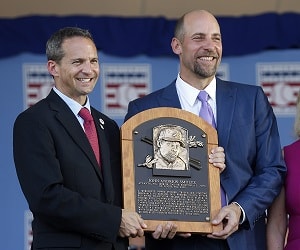
When the World Series airs on the Fox Network in late October, millions of viewers will tune in as Major League Baseball Hall of Fame pitcher John Smoltz tactically explains the action on the field—sometimes even before it happens.
Smoltz doesn’t claim to be clairvoyant, but as Fox’s Emmy Award-nominated MLB analyst, he astutely prepares viewers for the unforeseen twists and turns in a sport where the elusive flight of a baseball curves, veers, dips, fades and darts at velocities faster than automobiles on the German autobahn.
“It’s my job to get out in front, to predict and to give people an insight of how the games—the inner workings of the games—go,” says Smoltz, who will broadcast his fourth consecutive Fall Classic, something he also experienced as a player.
For five seasons in the 1990s (’91, ’92, ’95, ’96, ’99), Smoltz and his Atlanta Braves battled for World Series supremacy. The Detroit native is recognized as one of the greatest postseason pitchers in MLB history, with a lifetime record of 15-4 and 2.67 ERA (earned run average). In the eight World Series games Smoltz pitched, he struck out 52 batters in 51 innings on the way to becoming the postseason strikeout king (199).
And his Game 7 duel in the 1991 World Series against his childhood hero, Minnesota Twins pitcher Jack Morris—a 1-0, 10-inning loss—was ranked as the second greatest game of the last 50 years by MLB Network in the 2011 series “MLB’s 20 Greatest Games.”

Meanwhile, as sports journalists debate the game’s current trajectory as America’s national pastime in the wake of soccer’s soaring popularity, Smoltz says the ultimate highlight of his 21-year career as a major leaguer will forever be the victory he claimed in 1995.
That year, his Atlanta Braves won the World Series, achieving the greatest glory that baseball offers. But that moment was eclipsed by a bigger moment that same year inside a restaurant.
With the team’s chaplain at his side, Smoltz prayed to receive God’s gift of grace and forgiveness. His world changed forever.
“I was not going to just keep saying the prayer,” Smoltz recalls. “I knew I needed to understand and trust that I can literally put my faith in Jesus Christ and that is a heartfelt contract, and that I can now offload everything that I have been carrying. I realized I don’t have to carry that anymore.” That day, the change that came from repenting of his sin and trusting Christ brought a freedom he had never known.
The following year, Smoltz leveraged his fastball, slider and splitter to garner the Cy Young Award as the National League’s best pitcher while posting a 24-8 record, 2.94 ERA and league-leading 276 strikeouts. Following the team chaplain’s advice, Smoltz read from the Book of Philippians every day throughout that ’96 season and today claims John 15:5 as his life verse.
“It wasn’t because I became a Christian that I won the Cy Young,” he says. “It was because I became a Christian that I was able to handle what was about to happen that year and the years after, and there’s a big difference.”
But one thing that didn’t change was Smoltz’ fierce competitive spirit. “I really believed that embodying that warrior mindset was what God had called me to do.”
Off the field, Smoltz rallied his teammates to attend chapel with him regularly. He’d say, “I’m available. I’ll talk. I care about your heart, not just what you can do for us as a baseball player.’”
Reflecting on his life and career on an August afternoon at his Atlanta-area home, Smoltz says he wouldn’t trade his upbringing for anything.
“Morally, my parents were phenomenal in teaching me the right perspective of life,” he says. “But I was very works-driven—don’t drink, don’t smoke, don’t cuss, don’t do this. It was a lot of don’ts.”
Smoltz attended his first World Series in 1984 to root for his hometown Detroit Tigers, who defeated the San Diego Padres four games to one. His grandfather and father worked on the Tigers Stadium groundcrew for years and celebrated the championship by transplanting a piece of Tiger Stadium sod in their backyards.
Drafted out of high school by the Tigers in the 22nd round of the 1985 amateur draft, Smoltz spent two seasons in the minor leagues before he was traded to the worst team in baseball at the time—the Braves.
The rest is history—commemorated on a plaque since 2015 and on display at the Baseball Hall of Fame in Cooperstown, New York, alongside other legends of the game.
Smoltz is the only pitcher in MLB history to record at least 200 wins (213-155) and 150 saves (154). When he fanned his 3,000th batter in 2008, he became the 16th pitcher to reach the iconic milestone (3,084).
In 1991, Smoltz helped lead the worst-to-first Braves to their first of 14 consecutive division titles (1991-2005)—the only Brave to be on the roster for the entire historic run. And he “toed the rubber” in all five of the team’s Fall Classic clashes throughout the ’90s.

Smoltz’s well-earned reputation for pitching his best in the biggest games can be traced to his childhood growing up in an Italian-Catholic family on Maycroft Street in Lansing, Michigan.
“I’ve pitched a hundred Game 7s as a kid in Lansing. I threw against a small brick wall … 40 feet from the wall, and I would put up this tape of a strike zone and I would master trying to get four quadrants of a strike zone with a rubber ball,” Smoltz recalls. “In my mind, every day I created a Game 7. Every day, I created the biggest moments. I was the star. I was everything you could be because it was just me and the wall and a rubber ball.”
Smoltz says he believes that creating those scenarios in his mind helped prepare him for the biggest moments of his career.
“So to pitch three seventh games is a dream come true, but to only give up two runs in those three games and only win one of them, that just doesn’t seem possible,” Smoltz says, still perplexed by how those games turned out. “It’s like, how does that happen? But it did.”
Recalling his multiple elbow and shoulder surgeries, which triggered a temporary transition from an elite starting pitcher to bullpen ace (2001-04) before returning to the starting rotation, the 52-year-old father of six adult children and rookie grandfather seems more philosophical than nostalgic.
“I had to work really hard at it,” he says. “And when you have that instilled in you and you work hard, you’re always trying to reach the next goal—you’re never complacent. And I think that’s the only reason, besides God’s wiring and just the faith to say ‘I trust You, and I’m going to go forward,’ that’s the only reason I played 21 years.”
The worst of Smoltz’s injuries benched him for the 2000 season, requiring the renowned career-saving “Tommy John surgery” to repair a tear of the medial collateral ligament in his right elbow followed by intensive rehab, including modifying his throwing motion.
He describes the setback as a blessing because it afforded him time away from the rigorous, season-long travel schedule to launch a private college-prep Christian school in Alpharetta, Georgia, called King’s Ridge Christian School. Today the school educates about 800 students in grades K-12.
He likened God’s favor on King’s Ridge to what he witnessed while on the platform as Billy Graham invited Crusade attendees in the Georgia Dome in 1994 to commit their lives to Christ.
“I remember bowing my head praying, ‘Please God, don’t let Atlanta embarrass Billy Graham,’” says Smoltz, who at the time admittedly was trusting more in his good works than Jesus as Savior. “And as I looked up, I’m like ‘How small am I, and how small do I think God is?’ The place was packed. There were so many people. It was mind-blowing.”
Smoltz retired with little fanfare in 2009 after short stints with the Boston Red Sox and St. Louis Cardinals. He says consistency is the key to long-term success in baseball, and it is also necessary in the Christian life.
The adversary wants nothing more than to destroy or undermine our witness for Christ, Smoltz warns. “So I feel like I am always learning to trust more of Him and less of me.”
Whether it’s rehabbing from imminent double-hip replacement surgery, cherishing a second chance at marriage with a blended family, or trying to conquer another sport like golf on the Senior PGA Tour, Smoltz says he will continue to trust God with the process.
“I had to learn that I’m not in control as much as I think. I’m working toward the place where God wants me to be as He continues to mold me. I’m nowhere near. But I’m nowhere close to the person I once was.”
Give To Where Most Needed
